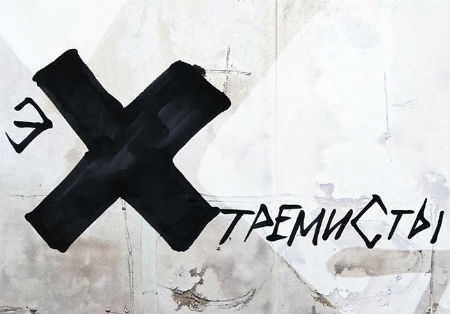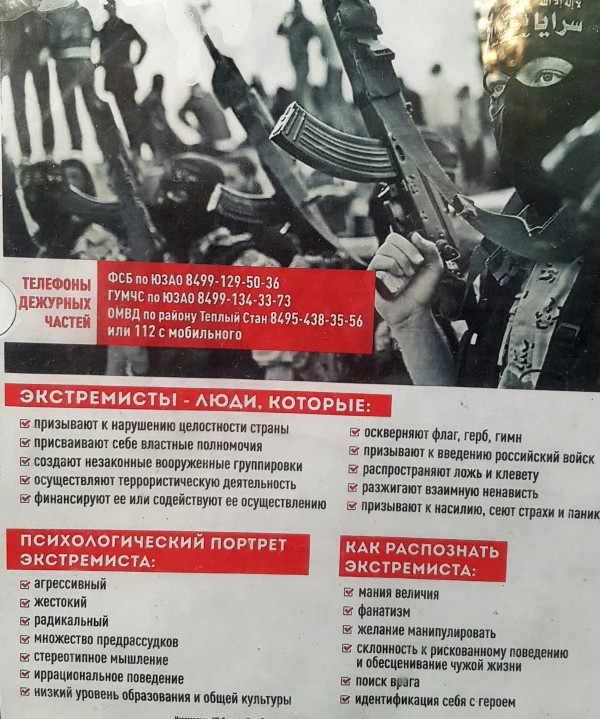
The founder of the Left Resistance movement, Darya Polyudova, has been sentenced to nine years in a penal colony on charges of “creating an extremist community.” Polyudova was already serving time on another charge, and had three years left to go in her sentence.
The Second Western District Military Court has handed down the new sentence to the activist. It agreed with the prosecution’s arguments that the Left Resistance, as created by Polyudova, was an “extremist community.” And yet, at the moment there is no such organization listed in the Russian Justice Ministry’s registry of “extremist organizations.”
In addition to “creating an extremist community” (Article 282.1.1 of the Russian Federal Criminal Code), the court found the activist guilty on two counts of “condoning terrorism” (Article 205.2.2 of the Russian Federal Criminal Code) over posts published on the movement’s social media page.
The sentence took into account Polyudova’s previous sentence of six years, which she received in 2021, writes Mediazona.
Polyudova was the first person in Russia charged under the criminal code article outlawing “calls for separatism” (Article 280.1). This accusation was brought against her in 2014 for trying to hold a “March for the Federalization of the Kuban” in Krasnodar.
One charge after another
Polyudova began her career as a political activist in Novorossiysk, where she organized Strategy 31 protests. Due to constant arrests and dismissals from work, Polyudova was forced to move to Krasnodar, and later to Moscow.
She went on pickets in support of Ukrainian and Crimean Tatar political prisoners, and the defendants in the Moscow Case and the Network Case, against the construction of a landfill in Shiyes, and against plans to build a church on a city square in Yekaterinburg.
In 2017, Polyudova was released from a work-release penal colony where she spent two years on charges of calling for separatism, and founded the Left Resistance. The description of the movement on its VK page stated that it “stands against the oppressor capitalists and for all the oppressed and the power of the working people.” The movement’s members attended protest pickets and distributed leaflets.
In January 2020, Polyudova was arrested again on charges of calling for separatism — this time for a solo picket where the activist stood holding a placard that read, “Kuriles, stop feeding Moscow! Long live the Far Eastern Republic!”
She was also charged with publicly condoning terrorism over a repost of a message about the Chechen field commander Shamil Basayev.
The calling for separatism charge against Polyudova was eventually dropped due to the liberalization of Article 280.1 of the Russian Federal Criminal Code. However, in September 2020, the activist, who by that time had been in remand prison for more than six months, was charged with a new offense.
The FSB regarded her statements about Yevgeny Manyurov, who opened fire at the FSB headquarters on the Lubyanka in December 2019, as grounds for charging Polyudova with “condoning terrorism.” Later, this charge was reduced to a charge of calling for separatism.
In May 2021, Polyudova was sentenced to six years in a penal colony on charges of publicly condoning terrorism and calling for extremism.
Polyudova was presented with new charges of “creating an extremist community” in December 2021, while she was in remand prison awaiting an appeal against the previous sentence.
Source: “Activist Darya Polyudova sentenced to nine years — this is her third prison sentence,” BBC News Russian Service, 23 December 2022. Translated by TRR
Left Resistance founder Darya Polyudova has been sentenced to nine years in a penal colony, while Left Resistance activist Kirill Kotov has been sentenced to three years probation, the Telegram channel Free Kirill Zhukov reports.
Polyudova’s sentence incorporates the previous verdict against her and will run from January 2020, when the young woman was remanded to a pretrial detention center in a previous criminal case, her lawyer Leonid Solovyov told OVD Info.
The prosecution had requested just this sentence for Polyudova, but had asked that Kotov be sentenced to three years in a penal colony.
Polyudova was accused of “creating an extremist community” (per Article 282.1.1 of the Criminal Code), while Kotov was accused of involvement in an “extremist community.” Polyudova was also charged on two counts of public calls for terrorism or “condoning terrorism” (per Article 205.2.2 of the Criminal Code).
According to the FSB, Polyudova created the Left Resistance to “plan and commit crimes, […] namely, public vindication of terrorism and public calls for extremist activity.” Investigators argued that the “extremist community” engaged in holding pickets and making posts on social media.
In addition to Kotov, four other activists have been charged with involvement in the extremist community: Sergei Kirsanov, Alyona Krylova, Igor Kuznetsov, and Andrei Romanov.
On 18 November 2021, the FSB searched two addresses as part of the case against the Left Resistance, including the house where Kotov used to live. The criminal charges against the movement were made public on 3 December 2021. Tomsk opposition activist and RusNews journalist Igor Kuznetsov was already in remand prison in connection with the case of the Telegram channel Chto-Delat! Andrei Romanov and Alyona Krylova were not in Russia, while Sergei Kirsanov and Kirill Kotov were released on their own recognizance. By this time, Polyudova had already been sentenced to six years in a penal colony in a previous case.
Polyudova was charged under the article criminalizing calls for terrorism over posts made in 2019 on the Left Resistance’s social media page, including a post entitled “Execute the traitor Putler for treason!” Forensic experts detected “calls for the violent seizure of power” and “use of violence against the security forces” in these posts. Another criminal count was based on posts made on anniversary of the annexation of Crimea and pickets in support of defendants charged with involvement in Hizb ut-Tahrir.
[…]
Polyudova founded the Left Resistance movement in 2017. Its activists said that the new left-wing organization’s purpose was to replace the “opportunistic Communist Party” and “defend genuine communist ideas.”
In May 2021, the court sentenced Polyudova to six years in a penal colony. She was found guilty on two counts: “condoning terrorism” (per Article 205.2.2 of the Criminal Code) in connection with a repost on VK, and “calling for extremist activity” (per Article 280.1 of the Criminal Code) for statements about the actions of the shooter outside the FSB headquarters building on the Lubyanka.
In 2014–2015, Polyudova was accused of calling for extremism and separatism. She was then sentenced to two years in a work-release (i.e., minimum security) penal colony.
Source: “Left Resistance founder Darya Polyudova sentenced to nine years in a penal colony,” OVD Info, 23 December 2022. Translated by TRR

 Extremists
Extremists






